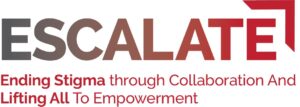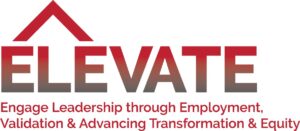NMAC’s ESCALATE (Ending Stigma through Collaboration and Lifting All to Empowerment) and ELEVATE (Engage Leadership through Employment, Validation, and Advancing Transformation and Equity) programs have opened new applications for trainings in 2021 and 2022.
 ESCALATE trains and empowers participants to recognize and address HIV stigma within every level of the Ryan White HIV AIDS Program. Training is available for both individuals and organizations.
ESCALATE trains and empowers participants to recognize and address HIV stigma within every level of the Ryan White HIV AIDS Program. Training is available for both individuals and organizations.
ESCALATE’s first four trainings of the second year of the program will be on the following dates:
Nov. 15-19: Indian Country (application deadline of Oct. 22)
Dec. 13-17: Open (application deadline of Nov. 1)
Jan. 18-22: Open (application deadline of Dec. 13
Feb. 14-18: Puerto Rico, conducted in Spanish (application deadline of Jan. 2)
To apply for an ESCALATE training, visit TargetHIV.org/ESCALATE.
 ELEVATE builds the capacity of Persons with HIV (PWH) to be meaningfully involved in the planning, delivering, and improving of Ryan White HIV/AIDS Program services.
ELEVATE builds the capacity of Persons with HIV (PWH) to be meaningfully involved in the planning, delivering, and improving of Ryan White HIV/AIDS Program services.
ELEVATE’s first three trainings will also each focus on a specific population:
Nov. 1-5: MSM (application deadline of Oct. 15)
Dec. 6-10: Latinx, conducted in English (application deadline of Nov. 15)
Jan. 10-14: Cisgender women (application deadline of Dec. 15)
To apply for an ELEVATE training, visit TargetHIV.org/ELEVATE.
NMAC will host an informational webinar on the ELEVATE program on Tuesday, Oct. 12, at 2:00 PM EST. The webinar will be available at https://us02web.zoom.us/j/85201291224.
ELEVATE is supported by the Health Resources and Services Administration (HRSA) of the U.S. Department of Health and Human Services (HHS) as part of a financial assistance award totaling $799,201.00 with 100 percentage funded by HRSA/HHS. The contents are those of the author(s) and do not necessarily represent the official views of, nor an endorsement, by HRSA/HHS, or the U.S. Government.
ESCALATE is supported by the Health Resources and Services Administration (HRSA) of the U.S. Department of Health and Human Services (HHS) and the Minority HIV/AIDS Fund (MHAF) as part of a financial assistance award totaling $1,640,827. 100 percentage funded by HRSA/HHS. The contents are those of the author(s) and do not necessarily represent the official views of, nor an endorsement, by HRSA/HHS, or the U.S. Government.